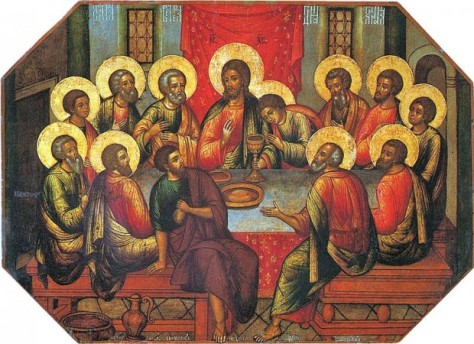After the Israelis came out of Egypt God made a covenant with them. The covenant, which is not simply to be remembered but to be renewed, represented every time in a special way. God called His people to celebrate the Passover (Ex 12; 1-11; 14), the greatest feast for the Israelis. It was not enough to slay a lamb, the lamb had to be eaten. Only then the covenant with God was renewed.
Christ, the true Lamb (Jn 1:29) has fulfilled the Jewish Passover. By changing unleavened bread and wine into His Body and His Blood, He gave the Passover a true meaning. He established a New Covenant, which was accomplished on the cross on Mount Calvary.
The covenant with God is effective only when the sacrificial meal is eaten. As Christ said: take it and eat it (Mt 26:26). Eating Christ’s Body and drinking His Blood truly unites us to the Almighty God: Those who eat my flesh and drink my blood abide in me and I in them (Jn 6:56).
During the Holy Sacrifice of the Mass people can renew the covenant with God by eating Christ’s Body and drinking His Blood. The first Christians held fast to Christ’s words: Do this in remembrance of me (1 Cor 11:25). They did celebrate the Holy Eucharist (which at that time was called the breaking of the bread). It was something extremely important, something essential for them to come together to celebrate the feast, the Eucharist: They devoted themselves to the Apostles’ teaching and to fellowship, to the breaking of the bread and to prayers (Acts 2:42). On the first day of the week, when we met to break the bread… (Acts 20:7). The experience described by the Apostle John as a marriage feast, as the Lamb’s Supper (Rev 19:9) continues on earth. Heaven lowers itself down and touches the earth. While still on earth we take part in that heavenly feast: But you have come to Mount Zion and to the city of the living God, the heavenly Jerusalem, and to innumerable angels in festival gathering… (Heb 12:22-24). The belief of Christ’s real presence in the Eucharist comes down to us from the Apostles themselves. It was kept unchanged by the first Christians, the Apostolic Fathers:
Ignatius of Antioch (+110 A.D.) writes:
I have no taste for corruptible food nor for the pleasures of this life. I desire the Bread of God, which is the Flesh of Jesus Christ, who was the seed of David; and for drink I desire his Blood, which is love incorruptible (Letter to Romans 7,3).
Justin Martyr (+164 A.D.) says:
We call this food Eucharist, and no one else is permitted to partake of it, except one who believes our teaching to be true and who has been washed in the washing which is for the remission of sins and for regeneration [i.e. has received baptism] and is thereby living as Christ has enjoined. For not as common bread nor common drink do we receive these; but since Jesus Christ our Savior was made incarnate by the word of God and has both flesh and blood for our salvation, so too, as we have been taught, the food which has been made into the Eucharist by the Eucharistic prayer set down by Him, and by the change of which our blood and flesh is nourished, in both the flesh and the blood of that incarnated Jesus (First Apology 66).
Saint Irenaeus (+ 202 A.D.) writes:
The Eucharist which is the Body and Blood of Christ; so also our bodies nourished by it and deposited to the earth and decomposing therein, shall rise up in due season, the Word of God favoring them with resurrection in the glory of God the Father (Against Heresies 5,3,1).
Saint Cyprian (+258 A.D.) wrote:
If Jesus Christ our Lord and God, is Himself the High Priest to God the Father, and if He offered Himself as the sacrifice to the Father; and if He commanded that this be done in commemoration of Himself – then certainly the priest, who imitates that which Christ did, truly functions in the place of Christ (Letter to a certain Cecil 63.14).
Cyril of Jerusalem (+386 A.D.) said:
Do not, therefore, regard the Bread and the Wine as simple as that; for they are, according to the Master’s declaration, the Body and Blood of Christ. Even though the senses suggest to you other, let faith make you firm. Do not judge in this matter by taste, but – be fully assured by the faith, not doubting that you have been deemed worthy of the Body and Blood of Christ (Cat. Lectures 22,6).
After the Israelis came out of Egypt God made a covenant with them. The covenant, which is not simply to be remembered but to be renewed, represented every time in a special way. God called His people to celebrate the Passover (Ex 12; 1-11; 14), the greatest feast for the Israelis. It was not enough to slay a lamb, the lamb had to be eaten. Only then the covenant with God was renewed.
By Fr Zdzslaw Karczewski
